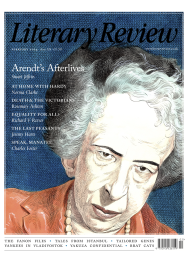James Womack
Novel Form of Politics
The Wizard of the Kremlin
By Giuliano da Empoli (Translated from French by Willard Wood)
If bad language gets to you, look away now. ‘Now, listen to me, you fucking bastards. These are someone’s fucking fathers and someone’s sons. And those bastards who aren’t giving us any ammunition will end up in hell, chewing on their own fucking guts.’ A little too feisty? Does the following sit better? ‘Do you know what a casino is, really? A monument to man’s irrationality. If men were rational creatures, casinos wouldn’t exist. Why in God’s name would anyone agree to throw his money away in a place where all the odds are against him? But thank God men are not rational creatures.’
The initial tirade comes from an internet video in which Yevgeny Prigozhin, the leader of the Wagner Group until his 2023 murder by plane crash, lays into the Russian government for failing to provide his troops with ammunition. The second comes from a fictional Prigozhin, who appears as a minor character in Giuliano da Empoli’s novel The Wizard of the Kremlin. The contrast between the emotive if inarticulate speech of the real man and the sub-Dostoevskyisms of his fictional avatar tells us a lot about the kind of novel this is, the things it’s trying to do and the ways it doesn’t quite manage to do them.
The protagonist is a post-Soviet politician, a man with an eye for the main chance who becomes Vladimir Putin’s right-hand guy as the 1990s flicker out, and who sits at the top table for the next two decades. In the novel, the man is called Vadim Baranov – baran being

Sign Up to our newsletter
Receive free articles, highlights from the archive, news, details of prizes, and much more.@Lit_Review
Follow Literary Review on Twitter
Twitter Feed
'A charming and amusing personal history'
Don't miss this brilliant @Lit_Review review of #WorldCupFever 👇
@KuperSimon's must-read footballing journey in nine tournaments is out now ⚽️🏆
Michael Taylor - The Beautiful Game
Michael Taylor: The Beautiful Game - World Cup Fever: A Footballing Journey in Nine Tournaments by Simon Kuper; Th...
literaryreview.co.uk
In the summer of 1918, the Caspian port of Baku played host to a remarkable group of Allied soldiers, sent to defend oil wells against the Ottomans.
Anna Reid recounts their escapades.
Anna Reid - Mission Impossible
Anna Reid: Mission Impossible - Mavericks: Empire, Oil, Revolution and the Forgotten Battle of World War One by Nick Higham
literaryreview.co.uk
Alfred, Lord Tennyson is practically a byword for old-fashioned Victorian grandeur, rarely pictured without a cravat and a serious beard.
Seamus Perry tries to picture him as a younger man.
Seamus Perry - Before the Beard
Seamus Perry: Before the Beard - The Boundless Deep: Young Tennyson, Science, and the Crisis of Belief by Richard Holmes
literaryreview.co.uk